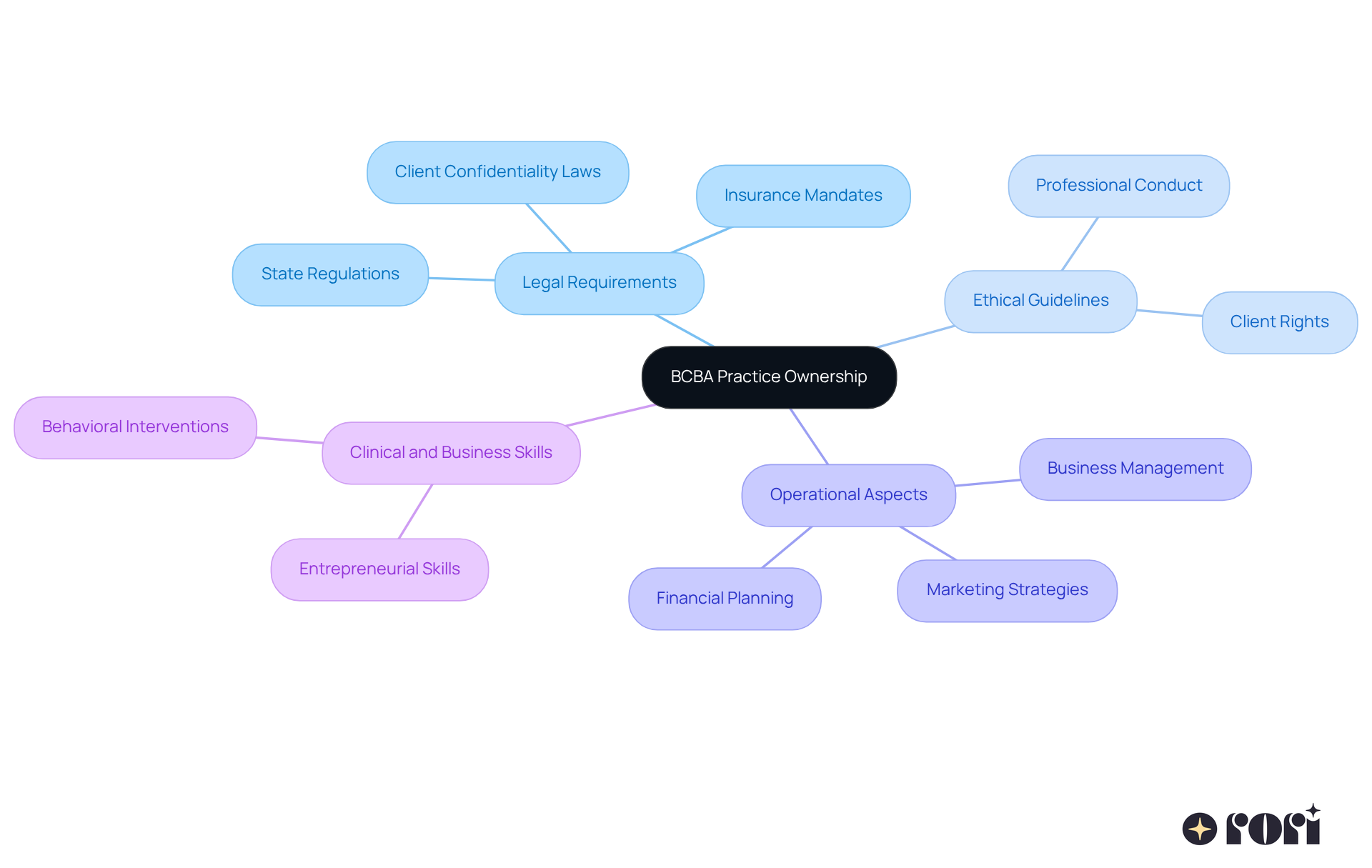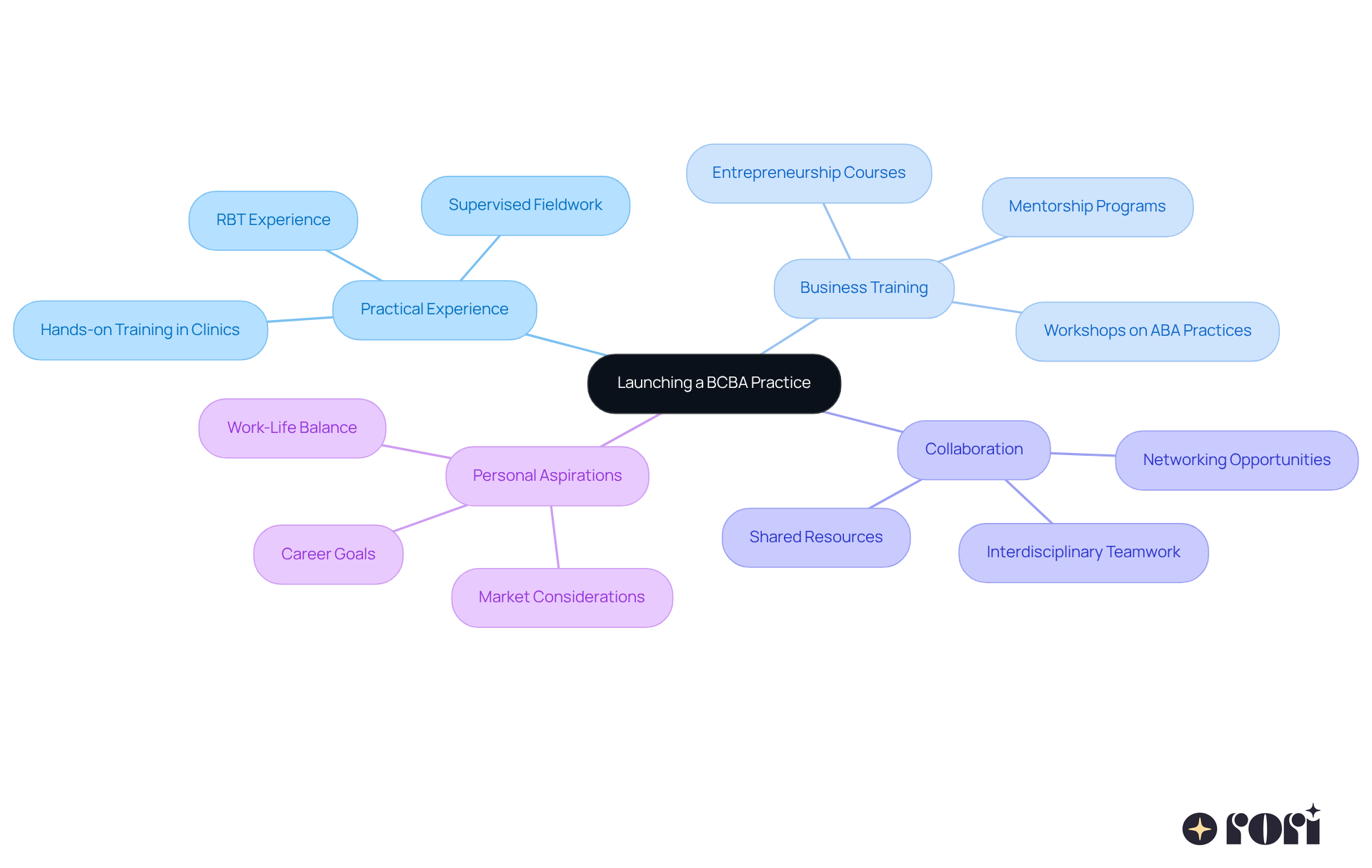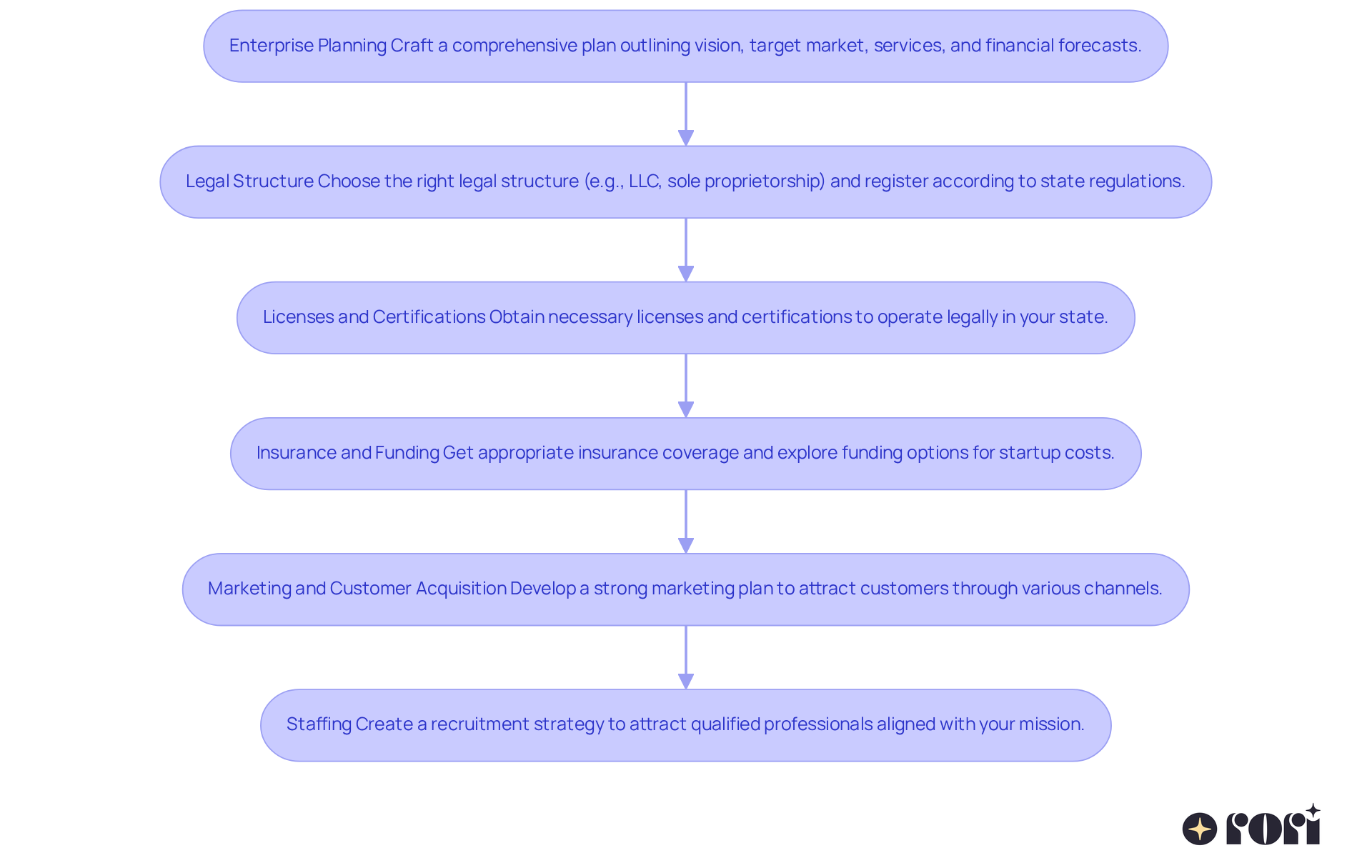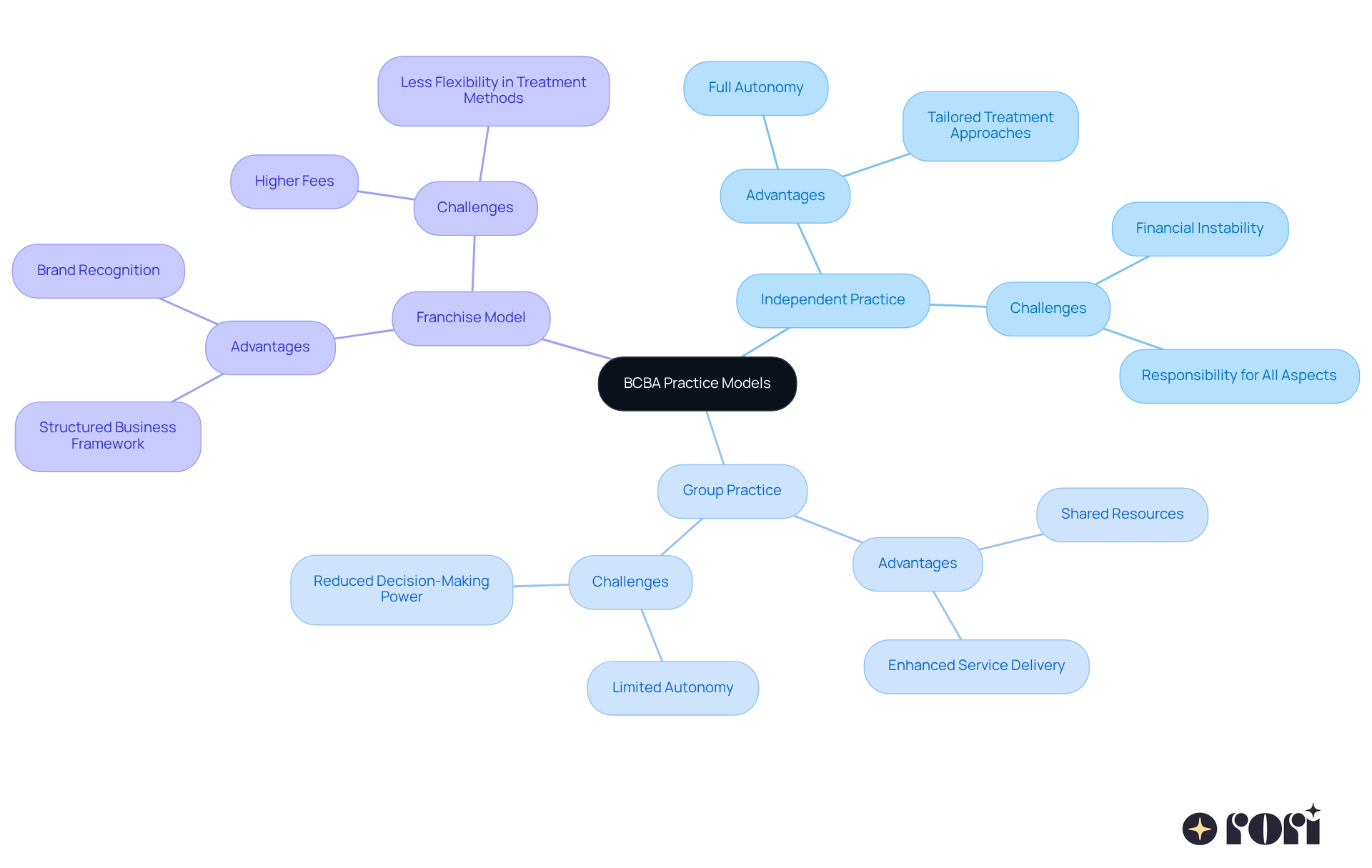A BCBA can open their own practice, which means they can offer personalized care tailored to each client's unique needs. However, it’s important to understand the legal and operational complexities that come with running a business. This article breaks it down by detailing key steps like:
It also highlights the benefits and challenges of different practice models. This emphasizes how crucial it is to blend clinical expertise with business savvy for successful practice ownership. Let’s explore this together!
Navigating the world of behavior analysis can be both rewarding and complex, especially for Board Certified Behavior Analysts (BCBAs) thinking about opening their own practice. This journey not only allows them to provide personalized care but also challenges them to grasp the ins and outs of running a business, like legal compliance and operational management.
Did you know that about 25% of BCBAs are on this path? It raises an important question: what are the essential steps and considerations for successfully launching a BCBA practice? Exploring this topic reveals a landscape filled with opportunities and potential pitfalls. It’s crucial for aspiring practitioners to understand the nuances of practice ownership.
Let’s explore this together!
A Board Certified Behavior Analyst (BCBA) is a professional who has completed specific educational and certification requirements to provide behavior-analytic services. Owning a behavior analyst business is not just about delivering high-quality care; it also involves overseeing the intricacies of running a company. This dual responsibility means having a solid grasp of legal requirements, ethical guidelines, and operational aspects essential for a successful business.
As we look ahead to 2025, BCBA ownership will be shaped by various legal requirements, including state regulations, insurance mandates, and client confidentiality laws. It’s important for BCBAs to be skilled in both clinical and business approaches to navigate these complexities effectively. Interestingly, around 25% of BCBAs can a BCBA open their own practice, indicating a growing trend among professionals who are pursuing independence in their work.
The question of whether can a BCBA open their own practice allows them to apply their treatment philosophies and tailor services to meet the unique needs of those they serve. This flexibility can lead to more personalized and effective care, enhancing the overall therapeutic experience. As one behavior analyst shared, "Managing my own business allows me to create an environment where I can truly focus on the individual needs of each child, tailoring interventions that resonate with their unique circumstances."
In summary, owning behavior analysis services presents an exciting opportunity for professionals to blend their clinical skills with entrepreneurial spirit, ultimately benefiting the clients they assist. Let’s explore this journey together!

Launching a BCBA business can be an exciting journey, and you might wonder if a question like, "can a BCBA open their own practice," is an important consideration, especially when starting by becoming a Registered Behavior Technician (RBT). Many BCBAs kick off their careers by gaining hands-on experience in established clinics or organizations. This practical experience is super important! It typically takes around 2-3 years to meet the qualifications needed before one can ask, "can a BCBA open their own practice?"
Some BCBAs also choose to enhance their skills through business training programs or mentorships focused on entrepreneurship in behavior analysis. Collaborating with other professionals can be a game-changer too, as it opens doors to shared resources and expertise. Plus, don’t forget about the wealth of online resources and community support groups available for guidance and networking!
Each pathway to launching your own business raises the question of "can a BCBA open their own practice," along with its own set of advantages and challenges. Your decision might depend on your personal aspirations, resources at hand, and the current market landscape. There are so many success stories out there! Numerous BCBAs have transitioned from established clinics to their own ventures, pondering the question, "can a BCBA open their own practice," often crediting the invaluable experience they gained during their early years in the field. Let’s explore this together!

While establishing a BCBA practice can feel like a big task, it raises the question of how can a BCBA open their own practice by breaking it down into key steps, making it manageable and even exciting! 😊 Let's dive into what you need to consider:
Enterprise Planning: Start by crafting a comprehensive plan that captures your vision and outlines your target market. Think about the services you want to offer and include some financial forecasts. It’s interesting to note that businesses with strategic plans see growth 50% of the time, compared to just 27% of those without. So, a solid plan is definitely worth your time!
Legal Structure: Next up, choose the right legal structure for your business—an LLC or sole proprietorship might be good options. Don’t forget to register your enterprise according to state regulations. This step is key for protecting your personal assets and building credibility.
Before determining if a BCBA can open their own practice, make sure you obtain the necessary licenses and certifications to operate legally in your state. For instance, securing a state license for behavior analysis is crucial for compliance and establishing your credibility in the field.
Insurance and Funding: It’s wise to get appropriate insurance coverage to protect your operation from potential liabilities. Also, consider exploring funding options like loans or grants to help cover those startup costs, which can range from $300,000 to $350,000 for an ABA clinic.
Marketing and Customer Acquisition: Now, let’s talk marketing! Developing a strong marketing plan is essential for attracting customers. This could mean building a professional website, networking with local healthcare providers, or even using social media, where 72% of millennials look for health-related advice.
Staffing: If you’re planning to bring on more team members, think about a recruitment strategy that attracts qualified professionals who resonate with your organization’s values and mission. Having the right team can make a huge difference, as employee-related expenses can significantly affect both financial performance and client outcomes.
As you work through these steps, consider how incorporating AI-driven solutions might enhance your efficiency. For example, automating progress report writing could free up to 50% more of your time for direct child treatment, ultimately leading to better outcomes. At Rori Care, our clinical leadership team is passionate about neurodiversity and empowering caregivers with ABA principles, ensuring that every child gets the support they need to thrive.
Let’s explore this together! We’re here to help you every step of the way!

When evaluating BCBA practice models, several key factors come to light. In the independent practice model, the question of whether a BCBA can open their own practice arises, as it provides them full autonomy to tailor treatment approaches to meet individual needs. However, it can lead to financial instability since practitioners handle everything from billing to marketing.
Each model has its own unique advantages and challenges, and the choice ultimately depends on the BCBA's professional goals, available resources, and the specific needs of their clients, particularly when addressing whether a BCBA can open their own practice. Did you know that independent practices often face more financial ups and downs than group practices? That’s because shared resources in group settings can lead to more consistent income streams. Understanding these dynamics is really important for parents like you, who are looking for the best care options for your children. Let’s explore this together!

Owning a BCBA practice is an exciting journey that allows professionals to blend their expertise in behavior analysis with their entrepreneurial dreams. This venture not only enables BCBAs to offer personalized services tailored to the unique needs of clients but also introduces various complexities that require a solid grasp of both clinical and business operations.
Starting a BCBA practice involves several essential steps, such as:
Each path to ownership comes with its own set of perks and challenges, highlighting the importance of preparation and support from seasoned professionals in the field. The insights shared here reveal the diverse models available to BCBAs—from independent practices to group settings and franchises—each offering its own unique benefits and potential drawbacks.
Reflecting on these insights, it’s clear that the choice to open a BCBA practice goes beyond professional independence; it’s about enhancing the quality of care for clients. For parents searching for the best therapeutic options for their children, grasping these dynamics is vital. Connecting with a BCBA who has thoughtfully navigated the complexities of practice ownership can lead to more personalized and effective treatment outcomes.
As the world of behavior analysis continues to evolve, staying informed and proactive empowers both practitioners and families to make the best choices for their needs. Let’s explore this together! We’re here to help you every step of the way!
What is a BCBA?
A Board Certified Behavior Analyst (BCBA) is a professional who has completed specific educational and certification requirements to provide behavior-analytic services.
What does owning a behavior analyst business entail?
Owning a behavior analyst business involves delivering high-quality care while also overseeing the intricacies of running a company, which includes understanding legal requirements, ethical guidelines, and operational aspects essential for success.
What are the legal requirements for BCBA practice ownership?
BCBA practice ownership will be shaped by various legal requirements, including state regulations, insurance mandates, and client confidentiality laws.
How many BCBAs open their own practice?
Approximately 25% of BCBAs open their own practice, indicating a growing trend among professionals pursuing independence in their work.
What are the benefits of a BCBA owning their own practice?
Owning their own practice allows BCBAs to apply their treatment philosophies and tailor services to meet the unique needs of their clients, leading to more personalized and effective care.
How does BCBA ownership enhance the therapeutic experience?
By managing their own business, BCBAs can create an environment focused on the individual needs of each client, allowing for tailored interventions that resonate with their unique circumstances.
What skills are important for a BCBA in practice ownership?
BCBAs need to be skilled in both clinical and business approaches to effectively navigate the complexities of owning a practice.